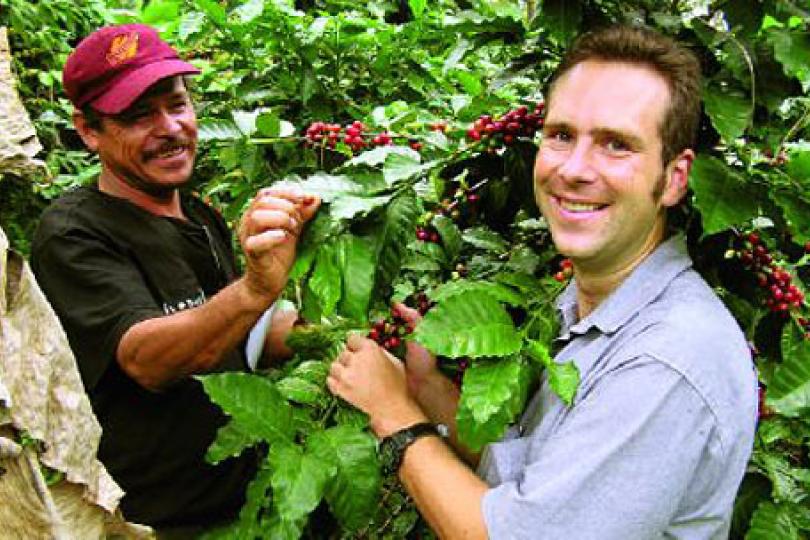Reducing seasonal hunger, food insecurity
By Aven Satre-Meloy, '13 Sustainability Intern -- Communications
Chris fondly remembers chopping wood and picking slugs off the lettuce in his family’s organic garden. He believes practicing his parents’ alternative lifestyle based initially on choice and then on necessity gave him a basic understanding of how to live sustainably, but he didn’t actually hear the term sustainability until he went to college at UC Santa Barbara to study Economics and Environmental Studies.
Although he teaches the social, economic, and political aspects of sustainability and environmental studies in his classes, Professor Bacon’s true passion—and his research interest—is sustainable food systems and food justice. “When I was a Peace Corps volunteer in Nicaragua,” he says, “I saw what it looks like for people to live off $2 a day. Many of these people were agricultural producers, and the products of their work, such as cigars, were exported to the US.”
When asked to explain food justice, Professor Bacon starts to define it and then stops, acknowledging the complexities inherent in the term. “Food justice,” he says, “is a principle of fairness and ecological sustainability that permeates and informs every step from the farm to the fork or from the crop to the cup.”
“Meeting people's needs is a key component of sustainability,” he explains; however, “the focus is too frequently narrowed to environmental and economic sustainability, and social justice is let go.” The solution that food justice provides is a renewed focus on the social justice aspects of sustainability without neglecting the importance of environmental and economic sustainability.
Professor Bacon is currently conducting research with smallholder farmers, non-profits, and community organizers in Nicaragua on sustainable food systems. Their shared goal is to reduce seasonal hunger and food insecurity. This upcoming summer he will analyze data from a survey of 260 randomly selected households as well as from some interviews and focus groups to further the research on seasonal hunger and diversified farming systems in Nicaragua.
He will examine the extent of seasonal hunger as well as its proximate and root causes, such as inequality, lack of access to healthy foods at affordable prices, and low agricultural yields. The Community Agricultural Network (CAN) in Central America, which Professor Bacon has worked closely with during his time in Nicaragua, has created a partnership with cooperatives, universities, and non-profit organizations to design and implement solutions to this critical problem.
Already they have developed seven community-based seed banks and five community-based grain storage and redistribution facilities in order to reach over 800 families living in Nicaragua.
Although Professor Bacon has chosen to work on food justice in Nicaragua, he acknowledges that these problems are global and that we need a multi-dimensional strategy to address issues of food insecurity and famines all over the world. “I always think about things in the long-term,” he says, “and to address this complex issue we need to begin to change the dynamics and structure of the food system so that people are able to democratically select the food they want and are able to eat the quantities they prefer every day.”
In order to achieve this difficult goal, Professor Bacon advises that we each must learn to be a critical and constructive thinker who can understand the social and ecological forces at work in the food system. Understanding is just the beginning, however, because we must compliment our knowledge with action—action as citizens, students, and consumers. “Fair Trade is not enough to move us toward food justice,” he explains. “We need more direct and engaging relationships between producers and consumers that reconvene trust and distribute value in fairer ways.”
Just as Professor Bacon started to learn from his parents how to live sustainably and now continues to revise his assumptions through ongoing reading, research, and conversations with friends and colleagues today, so too must we teach our children and the people around us so that the next generation of humans develop a respect for and commitment to the environment and to social justice.
Food justice is one of many sustainability dilemmas we will encounter in this century, and Professor Bacon believes that only through understanding and then collective action can we work to create a more ecologically and economically sustainable as well as socially just world.
This story originally ran on the Santa Clara University website

